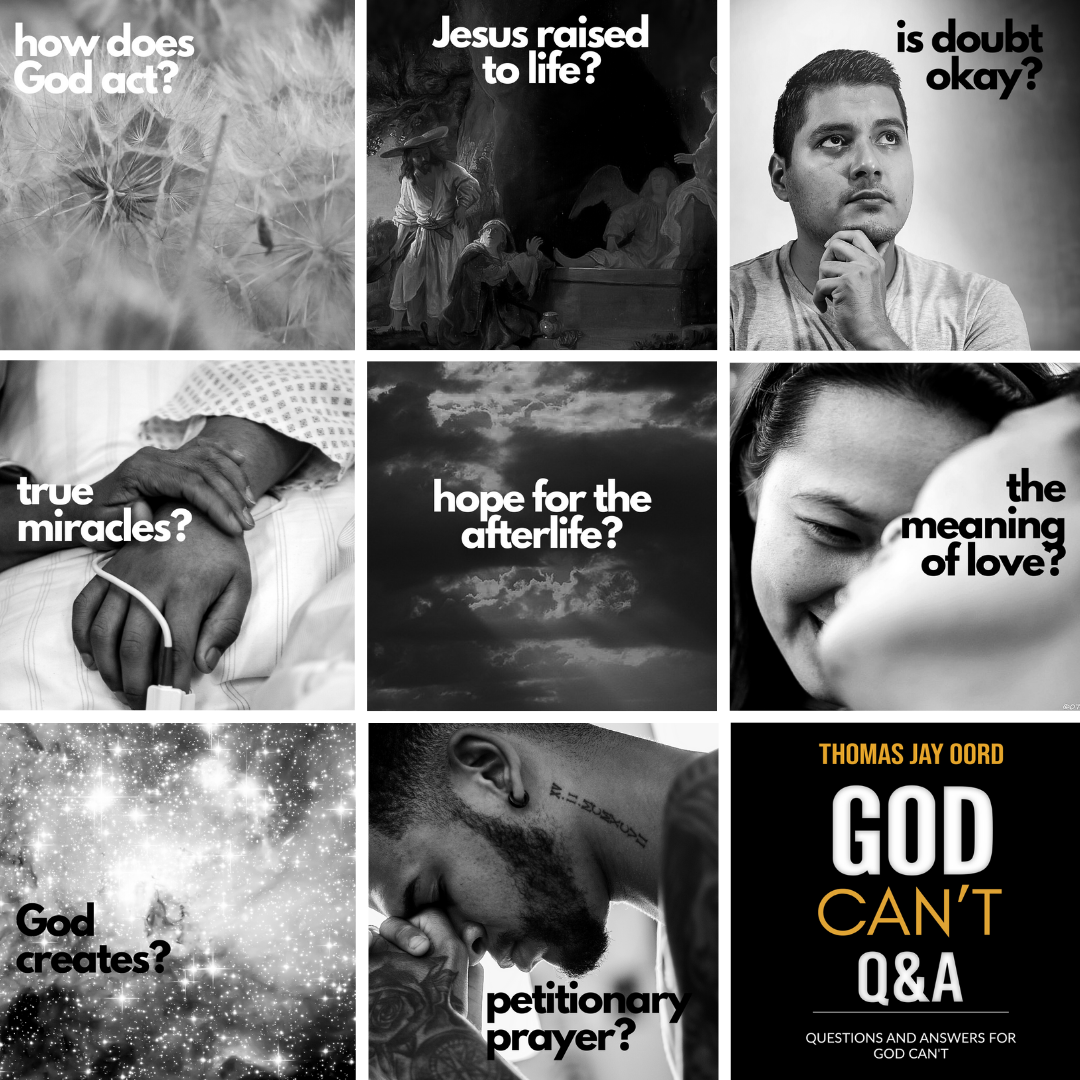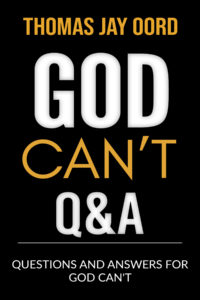Why Petition a God Who Can’t Control?
Most readers of my book God Can’t appreciate the idea God neither causes nor allows evil. An uncontrolling God of love is not blameworthy. But many wonder what a “God Can’t” view means for understanding petitionary prayer.
In my followup book, Questions and Answers for God Can’t, I offer an answer. In fact, I devote a chapter to answering the question: “If God can’t control, why pray?”
This blog essay offers a small excerpt from that chapter. I encourage you to get the book, of course, to read the whole chapter. Here’s a link for it.
Prayer takes many forms. This essay addresses what many call “petitionary prayer.” This involves asking God to do something. Is an uncontrolling God influenced by prayer, and does this God respond?
An All-Controlling God
To answer this question, let’s first look at two other views of God and prayer. Each has negative implications for understanding petitionary prayer, but believers seldom realize this.
To help us see what these alternative views of prayer entail, let’s take the hypothetical case of Tim. As I write this, Coronavirus/COVID-19 is killing hundreds of thousands of people and causing widespread harm. Let’s suppose Tim has contracted the virus and wants us to pray for his health.
Some people believe God controls absolutely everything. This is the “All God” view. It claims God does everything, because God is the omnicause. “God is sovereignly in control,” say people who embrace this view.
The All God view rejects the idea we’re genuinely free. God predetermines every moment of every creature. Most All God advocates believe God predestined all things from the foundation of the universe. And the God who predestines can foreknow everything that will happen.
Why Ask a God Who Controls All?
So… if a person believes God controls everything, what should we say when praying for Tim?
The All God view says God caused the Coronavirus. It’s God’s will. Most who affirm this view believe God predestined the Coronavirus to kill, wreak havoc in the world, and sicken millions. Before the foundation of the world, God decided the virus would sicken Tim in particular. It’s all part of God’s meticulous blueprint.
If I believed the All God view, I could not bring myself to petition God. I would not pray for Tim. Here’s why…
Petitionary prayer involves asking God to do something in the future. But the God who predetermined everything can’t respond to such prayers. The future is already settled, and what will occur has already decided. If God predetermined Tim to contract the virus, my prayers make no difference to helping him. Asking God to do something new makes no sense.
In fact, my request for Tim’s healing seems to oppose God’s will. From the All God perspective, after all, God wanted Tim to be sick. And acting against God’s will is, by definition, sin. Praying for Tim would be sinning!
I can’t get inspired to ask something of a God for whom my actions make no difference. Besides, if the All God view is true that God wills everything, God wills that I can’t get inspired to pray for Tim!
The Conventional View of God
Most people don’t believe the All God view. Most believe they act freely, at least sometimes. And most think the future has not been predestined, even if they say God (mysteriously) knows everything that will occur. This leads to our second view of God and prayer.
The second view assumes what I call the “Conventional” view of God. People who believe in the Conventional view think God singlehandedly fixes things from time to time. But they think God usually allows the free processes of existence and free creatures to exert influence too.
Many people who identify as “classical Arminians” embrace this view of prayer. It says God can and sometimes does singlehandedly bring about results, cure people, stop evil, and so on. God foreknows everything that will ever occur without determining all of it. This God doesn’t control everything but sometimes controls some things.
Does this view make sense when praying for Tim?
Not really. The Conventional God is allegedly perfectly loving, has controlling power, and knows in advance everything that will ever occur. This God could heal Tim without our prayers, cooperation, medicine, or creaturely influences.
And yet… this God rarely heals. Tim suffers from a virus the Conventional God foreknew and could stop singlehandedly but has refused to do so.
Conventional theology implies God sometimes requires prayer to get him off his butt and do what’s loving. Believers must beg, plead, or twist God’s arm to get good results. But if Tim is not healed, he’ll wonder if God has abandoned him, is punishing him, or this allows evil to teach a lesson. It’s confusing.
If God loves everyone and everything and can singlehandedly fix anything, why do we need to ask for help? Wouldn’t this God automatically fix what is fixable? And if God foreknows with certainty what will occur, petitionary prayer cannot change an already foreknown and therefore settled future.
My Daughter is Drowning
To explain why petitionary prayer makes little sense if the Conventional view is true, let me give an illustration.
Suppose I’m out with my family at a lake, and we’re enjoying a scorching summer afternoon. I look up from reading and see one of my daughters in the lake. In just a few seconds, I realize my daughter is drowning! Her head is bobbing up and down, and her arms are flailing. She’s gasping for air!
Suppose I could jump in and rescue my daughter. I’m a decent swimmer, and it’s likely I could save her life. But suppose I say, “She hasn’t asked for help. She’s not crying out, ‘Help me, Dad.’ So, I won’t rescue her until she asks.” Or suppose I say, “I’m not seeing anyone else begging me to save her. Unless 10 people ask, I will not leave the beach!”
No one would think I was a loving father if I could have rescued my drowning daughter but refused because I didn’t hear her ask. No one would say, “She didn’t ask for help, so he didn’t help. That was the loving thing to do.” Nor would anyone think I was loving if I waited for 10 people to ask me to help.
The Conventional view portrays God as having the ability to rescue singlehandedly but not always doing so unless we ask. It portrays God as metaphorically sitting back, arms folded, waiting for us to pray, or pray enough, before jumping in to help. Or it portrays God as waiting until a prayer chain of enough people intercede.
The Conventional God could singlehandedly heal Tim, prevent his illness, and fix just about anything. But for some mysterious reason, this God sometimes needs to be asked.
The God who could singlehandedly prevent evil but waits for us to ask is not a God of perfect love. A loving God who can save singlehandedly wouldn’t require us to beg, plead, or petition 352 times before healing Tim.
Petitionary Prayer and the Uncontrolling God
Petitionary prayer makes more sense in the uncontrolling love perspective. It assumes a relational view: God gives and receives in a relational world with relational creatures.
To many people, it’s obviously true that creation influences God. That’s the general view of God portrayed in the Bible, and it fits what many believers think today. The God who is angry at sin or blessed by praise is One whom creatures affect.
The uncontrolling love perspective fits the way most people pray, because most believe their prayers may affect God. God not only affects us and influences all creation moment by moment, we and all creation affect God. From the uncontrolling love view, petitionary prayer affects God. This is the first point for understanding prayer in a God Can’t perspective.
The idea creatures are relational is the second important aspect for understanding petitionary prayer from a God Can’t perspective. Creation is interconnected; action in one place affects those in others. My actions affect you; your actions affect me. Those actions may primarily be physical or mainly mental. But everything we do — including our prayers — affects ourselves and the world.
In the past, I would need to illustrate the idea creation is interconnected. But nearly everyone acknowledges this reality today. Our decisions affect our bodies, friends and family, societies, and the environment. Praying is an activity.
When we combine the idea that prayer affects God with the idea prayer affects ourselves and others, we can see how prayer makes a difference to an uncontrolling God and to the world.
Added to this is the truth that life moves on moment by moment. The past is complete, the present is becoming what it will be, and the future is open. God relates with us moment by moment as the Living Lover of history.[i]
Our prayer in one moment influences what is possible in the next. And the God who is present to all receives our actions each moment. This means our prayers open up new avenues for God to work. Fresh opportunities emerge each moment because we prayed.
Prayer generates new relationships, data, forces, factors, and information for God to respond to when deciding how to act in the next moment. Because we pray, God may have alternative paths to operate in, new cooperative agents to work with, and new opportunities to influence us and others.
Prayer Changes History
When I say prayer influences God and the world, I’m not saying prayer controls others or creation. I’m not saying our prayers guarantee the results we want. And I’m not saying prayer allows God to control. Petitionary prayer doesn’t “turbocharge” God to determine results singlehandedly. Our prayers are not coins in a vending machine that automatically dispenses the drink we want.
Prayer makes a difference, but it doesn’t control.
An uncontrolling love view says petitionary prayer makes a difference without fully determining others. It says our prayers affect God without saying prayers make it possible for God to determine others fully. It says praying opens new possibilities God can use in the next moment, without saying those possibilities guarantee the rescuing, healing, or blessing we seek. Prayer can be a factor in the good that occurs, but it doesn’t guarantee it.
In one sense, the uncontrolling love view fits what most believers think about God’s response to their prayers. Most doubt, for instance, their prayers force God to control. Few pray, “Dear God, force Uncle Joe to become loving.” Few pray, “God, control Jennifer to make her become a Christian.” Most people think God is uncontrollable, so our prayers don’t force God to do anything. I agree.
God is both uncontrollable and uncontrolling. We can’t control God, and there’s no sense trying. God is uncontrollable. But God can’t control us, others, or anything in creation. God is uncontrolling. God loves everyone and everything, so God can’t control anyone or anything.
“Controlling love” is an oxymoron.
This is a small portion of my chapter answering the question, “If God can’t control, why pray.” For the whole chapter and book, see this link.
[i] Christopher Fisher defends the open view that supports this claim by exploring various biblical passages. See his God is Open: Examining the Open Theism of the Biblical Authors (CreateSpace, 2017).




Comments